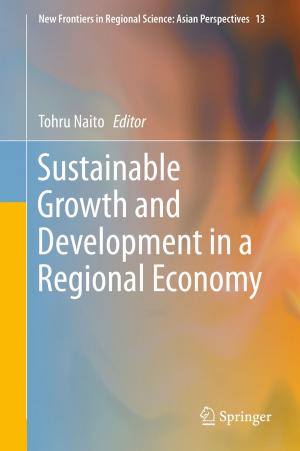Community Seed Production Sustainability in Rice-Wheat Farming
Nonfiction, Science & Nature, Technology, Agriculture & Animal Husbandry, Science, Biological Sciences, Environmental Science| Author: | Narayan Prasad Khanal, Keshav Lall Maharjan | ISBN: | 9784431554745 |
| Publisher: | Springer Japan | Publication: | May 7, 2015 |
| Imprint: | Springer | Language: | English |
| Author: | Narayan Prasad Khanal, Keshav Lall Maharjan |
| ISBN: | 9784431554745 |
| Publisher: | Springer Japan |
| Publication: | May 7, 2015 |
| Imprint: | Springer |
| Language: | English |
This book analyzes the sustainability of community seed production under a rice–wheat farming system from microeconomic perspectives, considering how seed producers benefit from community seed production and how those benefits continue into the future. Seed producers’ performance in resource management, governance and marketing strategies indicates current benefits, whereas soil conservation and risk-management practices provide the basis for future benefits. Community seed production is a local-level seed management system owned by farmers. This system provides the institutional mechanism to supply diversified seed demands of open-pollinated varieties of food crops in a cost-effective way in rural regions. Being able to address the concerns of food insecurity, poverty, climate stress and biodiversity loss in programs and policies of development agencies, community seed production is gaining popularity among the farmers and the policy makers in developing countries.
This book discusses the issues of organizational governance of the community seed producers’ groups and links them with household-level benefits to understand the organizational dynamism and the probable development paths of such organizations in the future. It also highlights the necessity to institutionalize lessons learned in community seed production in the stakeholders’ programs and policies. These understandings provide a basis for formulating policies for strengthening the system in developing countries. Students, researchers, policy makers and donor agencies working with CSP in the developing world will find this book useful in broadening their understanding of CSP in general and its sustainability in particular.
This book analyzes the sustainability of community seed production under a rice–wheat farming system from microeconomic perspectives, considering how seed producers benefit from community seed production and how those benefits continue into the future. Seed producers’ performance in resource management, governance and marketing strategies indicates current benefits, whereas soil conservation and risk-management practices provide the basis for future benefits. Community seed production is a local-level seed management system owned by farmers. This system provides the institutional mechanism to supply diversified seed demands of open-pollinated varieties of food crops in a cost-effective way in rural regions. Being able to address the concerns of food insecurity, poverty, climate stress and biodiversity loss in programs and policies of development agencies, community seed production is gaining popularity among the farmers and the policy makers in developing countries.
This book discusses the issues of organizational governance of the community seed producers’ groups and links them with household-level benefits to understand the organizational dynamism and the probable development paths of such organizations in the future. It also highlights the necessity to institutionalize lessons learned in community seed production in the stakeholders’ programs and policies. These understandings provide a basis for formulating policies for strengthening the system in developing countries. Students, researchers, policy makers and donor agencies working with CSP in the developing world will find this book useful in broadening their understanding of CSP in general and its sustainability in particular.















